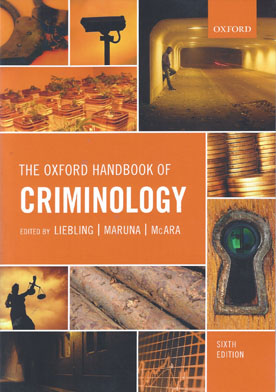
With contributions from over 60 leading experts in the field, The Oxford Handbook of Criminology is the definitive guide to the discipline providing an authoritative and outstanding collection of chapters on the key topics studied on criminology courses.
The Handbook has shaped the study of criminology for over two decades and, with this new edition, continues to be indispensable to students, academics, and professionals alike. Each chapter details relevant theory, recent research, policy developments, and current debates. Extensive references aid further research. Extensively revised, the sixth edition has been expanded to include all the major topics and significant new issues such as zemiology; green criminology; domestic violence; prostitution and sex work; penal populism; and the significance of globalization for criminology.
The Oxford Handbook of Criminology is accompanied by a suite of online resources providing additional teaching and learning materials for both students and lecturers. This includes selected chapters from previous editions, essay questions for each chapter, web links to aid further research, and guidance on how to answer essay questions.